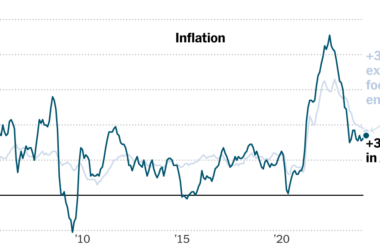On a wet Saturday afternoon in central Tokyo, 50 or so Chinese language individuals packed right into a grey, nondescript workplace that doubles as a bookstore. They got here for a seminar about Qiu Jin, a Chinese language feminist poet and revolutionary who was beheaded greater than a century in the past for conspiring to overthrow the Qing dynasty.
Like them, Ms. Qiu had lived as an immigrant in Japan. The lecture’s title, “Rebuilding China in Tokyo,” mentioned as a lot concerning the aspirations of the individuals within the room because it did about Ms. Qiu’s life.
Public discussions like this one was once frequent in large cities in China however have more and more been stifled over the previous decade. The Chinese language public is discouraged from organizing and collaborating in civic actions.
Up to now 12 months, a brand new kind of Chinese language public life has emerged — exterior China’s borders in locations like Japan.
“With so many Chinese language relocating to Japan,” mentioned Li Jinxing, a human rights lawyer who organized the occasion in January, “there’s a necessity for a spot the place individuals can vent, share their grievances, then take into consideration what to do subsequent.” Mr. Li himself moved to Tokyo from Beijing final September over issues for his security. “Folks like us have a mission to drive the transformation of China,” he mentioned.
From Tokyo and Chiang Mai, Thailand, to Amsterdam and New York, members of the Chinese language diaspora are constructing public lives which can be forbidden in China and coaching themselves to be civic-minded residents — the kind of Chinese language the Communist Celebration doesn’t need them to be. They’re opening Chinese language bookstores, holding seminars and organizing civic teams.
These émigrés are creating an alternate China, a extra hopeful society. Within the course of, they’re redefining what it means to be Chinese language.
4 Chinese language bookstores opened in Tokyo final 12 months. A month-to-month feminist open-mic comedy show that began in New York in 2022 was so profitable that feminists in at the very least 4 different U.S. cities, in addition to London, Amsterdam and Vancouver, British Columbia, are staging related exhibits. Chinese language immigrants in Europe established dozens of nonprofit organizations centered on L.G.B.T.Q., protest and different points.
Most of those occasions and organizations are usually not overtly political or geared toward attempting to overthrow the Chinese language authorities, although some contributors hope they are going to be capable to return to a democratic China sometime. However the immigrants organizing them say they consider it’s essential to be taught to stay with out concern, to belief each other and pursue a lifetime of goal.
Far too many Chinese language, even after leaving, have been for years too petrified of the federal government to attend public occasions not aligned with mainstream Communist Celebration rhetoric.
However in 2022, the White Paper protests that erupted in China to object to the nation’s pandemic restrictions prompted demonstrations in different international locations. Folks realized they weren’t alone, and began searching for like-minded individuals.
Yilimai, a younger skilled who has lived in Japan for a decade, mentioned that for the reason that 2022 protests he had been organizing and collaborating in protests and seminars in Tokyo.
Final June, he got here to a chat I gave about my Chinese language language podcast, “I Don’t Understand,” and was stunned to search out that he was amongst about 300 individuals. (I used to be stunned, too. Who would wish to take heed to a journalist speaking about her podcast?) He mentioned he had met and stayed linked with a few dozen individuals on the occasion.
“Participating in public life is a advantage in itself,” mentioned Yilimai, who used his on-line nickname as a result of he feared authorities reprisal. It means “a grain of wheat,” a biblical reference about resurrection.
China as soon as had, within the 2000s and early 2010s, what the German thinker Jürgen Habermas known as a public sphere. The authorities allowed room for full of life, if censored, public dialog alongside the state-sanctioned cultural and social life.
At bookstores in large Chinese language cities, Alexis de Tocqueville’s “Democracy in America” and Friedrich Hayek’s “The Street to Serfdom” have been greatest sellers. A e-book membership in Beijing began by Ren Zhiqiang, an actual property tycoon, drew China’s high entrepreneurs, intellectuals and officers. Shanghai Satisfaction, an annual celebration of L.G.B.T.Q. rights, attracted 1000’s of contributors. Feminist activists staged actions reminiscent of “occupy males’s bathrooms,” and official information outlets covered them as progressive forces. Unbiased movies, documentaries and underground magazines explored subjects that the Communist Celebration didn’t like however tolerated: historical past, sexuality and inequality.
Within the decade after Xi Jinping took over the nation’s management in late 2012, all of those initiatives have been crushed. Investigative journalists misplaced shops for his or her work, human rights attorneys have been jailed or disbarred, and bookstores have been compelled to close their doorways. Ren Zhiqiang, the property tycoon who began the e-book membership, is serving 18 years in jail for criticizing Mr. Xi. Organizers of nongovernmental organizations and L.G.B.T.Q. and feminist activists have been harassed, silenced or compelled into exile.
In flip, a rising variety of Chinese language have fled their dwelling nation, its authorities and its propaganda to locations that allowed them freedom. Now they’ll join with each other and provides platforms for Chinese language inside and out of doors the nation to speak and picture a distinct future.
Anne Jieping Zhang, a mainland-born journalist who labored in Hong Kong for 20 years earlier than transferring to Taiwan in the course of the pandemic, began a bookstore in Taipei in 2022. She opened a department in Chiang Mai, Thailand, final December and is planning to open in Tokyo and Amsterdam this 12 months.
“I would like my bookstore to be a spot the place Chinese language all around the world can come and alternate concepts,” Ms. Zhang mentioned.
Her bookstore, known as Nowhere, points passports of the Republic of Nowhere to its valued prospects, who’re known as residents, not members.
Nowhere’s Taipei department held 138 occasions final 12 months. The Chiang Mai department held about 20 occasions in its first six weeks. Themes have been wide-ranging: warfare, feminism, Hong Kong protests and cities and relationships. I spoke at each branches about my podcast.
Ms. Zhang mentioned she didn’t need her bookstores to be just for dissidents and younger rebels, however for any Chinese language one that was curious concerning the world.
“What issues just isn’t what you oppose however what sort of life you want,” she mentioned. “If the Chinese language or the Chinese language diaspora can not rebuild a society in locations with out top-down restrictions, even when we endure a change of regime, we positively received’t be capable to lead higher lives.”
Ms. Zhang and Mr. Li, the human rights lawyer who is healthier recognized for his pen title, Wu Lei, mentioned the Chinese language émigrés have been very completely different from their predecessors within the Eighties, who have been principally financial immigrants. The brand new émigrés are higher off and higher educated. They care about their financial well-being in addition to their sense of belonging in one thing greater than themselves.
Each Ms. Zhang and Mr. Li began their ventures with their very own cash. The month-to-month lease for Mr. Li’s roughly 700-square-foot house, which he makes use of primarily for occasions, is about $1,300. He mentioned he might afford it.
Ms. Zhang, presently a Nieman fellow at Harvard College, is subsidizing the Chiang Mai department together with her financial savings. The Taipei department made a revenue final 12 months. A rising supply of its earnings is mailing books to Chinese language all around the world.
On the identical Saturday in January because the seminar at Mr. Li’s bookstore in Tokyo, eight younger Chinese language sat round a eating desk in the home of a Japanese professor to debate the Taiwan election that was held the earlier weekend. They’ve been assembly at private and non-private occasions since final 12 months.
“We’re getting ready ourselves for China’s democratization,” mentioned Umi, a graduate pupil who moved to Japan in 2022 and took part within the White Paper protests. “We have to ask ourselves,” she mentioned, “If the Chinese language Communist Celebration collapses tomorrow, are we able to be good residents?”








